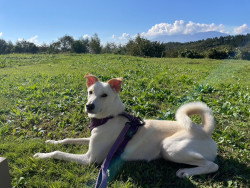
August 4, 2011
Voluntary Psychologists of Chile
A post-earthquake and tsunami NGO in Chile is reaching out to Japanese counterparts
By Metropolis
Originally published on metropolis.co.jp on August 2011

Metropolis spoke to Gabriela Zamorano and Director Sebastián Chacón, Psicólogos Voluntarios de Chile.
How did your NGO come about?
We started on March 1, 2010, just after the earthquake/tsunami that hit central Chile. A group of psychologist friends wanted to help those affected. Within a week more than 200 psychologists had joined. We worked with around 800 professionals in the first few months, all over the disaster zone, following recommendations of the WHO and APA. This developed into our own NGO. We have collaborated in the famous case of the 33 miners trapped underground and a fire in the San Miguel prison with 81 fatalities.
What kind of work have you done with survivors of the 2011 disaster? First we worked on psychological first aid and emotional support, psycho-educational workshops in 300 schools, trained people in relaxation and self-help techniques, routed people to specific clinics and empowered local groups and their leaders to create social support networks. We are working with the Ministry of Housing, with funding from the EU, to support more than 4,500 families living in temporary villages. The aim is that, where possible, happiness can prevail despite these people’s difficult situations.
Were there people not directly afflicted, who nonetheless were affected?
Of course, for example the professionals themselves who worked with survivors; families and friends; and the general population. In the north of Chile many were really scared even though they were not directly impacted, and have had psychological repercussions. But generally, those most affected have tended to have previous traumas that were exacerbated by the catastrophe.
How do you view the needs of the Japanese people after March 2011?
We are very sorry for the losses the Japanese people have had. We hope, in the same way as our country, after a few years, they can get back on their feet and learn from these events. The principal thing we could transmit is the importance of strengthening social networks. It’s families, neighborhoods and their relationships with state organizations, which can change the most important thing: the fear and uncertainty of the population. It’s important people talk about their deeper feelings; express them with loved ones—only then can a process of healing be begun.
Japan has also had its nuclear crisis, with a fear that people are suffering from something they are not aware of. How would your NGO counter this?
It’s a good idea to support the population with self-help pamphlets (as we have done in Chile). They must be given reliable information of what is occurring and possible consequences. With this information, anxiety decreases, even if the news is not what one wanted to hear. It’s a relief for people to share their feelings and see the same in others; to know that what’s happening is a normal reaction to an abnormal situation. Receiving precise, clear and truthful information is central for people’s psychic health. A good example is when a person hears about a loved one’s death, they wish to know the details of how it happened. It’s also important to recognize which symptoms to pay closer attention to, to know who needs specialist care to avoid more serious problems over the long term.

What kind of collaboration would you like to achieve with your counterparts in Japan?
We would like to share experiences; perhaps we can both learn from them and improve our processes. Cultural differences allow us to take different perspectives, have a meaningful exchange or complete research to improve our work.
How can people get in touch?
We can communicate in Spanish, English or French, but in the case of a more developed collaboration we could seek help from the embassy or an interpreter. Check out our site, or our Facebook page.







